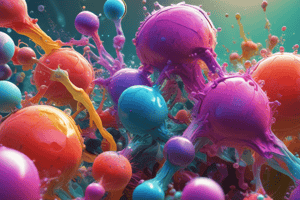Podcast
Questions and Answers
What is a characteristic of a pure substance?
What is a characteristic of a pure substance?
- It has distinct properties and a definite composition. (correct)
- It has a variable composition.
- It can be separated into simpler substances by physical means.
- It is always a liquid at room temperature.
Which of the following best describes a heterogeneous mixture?
Which of the following best describes a heterogeneous mixture?
- It consists of substances that cannot retain their identity.
- It has different composition, properties, and appearance throughout. (correct)
- It can be chemically decomposed into its components.
- It appears uniform throughout and cannot be easily separated.
What is an example of a compound?
What is an example of a compound?
- Sugar (sucrose) (correct)
- Salt water
- Gold
- Oxygen gas
Which state of matter is characterized by having a definite shape and volume?
Which state of matter is characterized by having a definite shape and volume?
Which of the following statements is true regarding elements?
Which of the following statements is true regarding elements?
What defines an extensive property of matter?
What defines an extensive property of matter?
Which of the following describes a chemical property?
Which of the following describes a chemical property?
In a chemical equation, where are the reactants typically located?
In a chemical equation, where are the reactants typically located?
What does the term 'flammability' indicate about a substance?
What does the term 'flammability' indicate about a substance?
Which of the following is NOT part of a chemical equation?
Which of the following is NOT part of a chemical equation?
Flashcards are hidden until you start studying
Study Notes
Characteristics of Matter
- Matter occupies space and has mass, made up of atoms, the smallest building blocks.
- Molecules consist of two or more atoms bonded together.
Classification of Matter
-
According to Composition:
- Substances have a definite composition and distinct properties.
- Elements: Unique types of atoms, cannot be decomposed further (e.g., Aluminum).
- Compounds: Composed of two or more elements (e.g., Aluminum oxide).
- Substances have a definite composition and distinct properties.
-
Mixtures consist of two or more substances maintaining their chemical identities.
- Components are the individual substances in a mixture.
- Heterogeneous Mixtures: Vary in composition and appearance (e.g., salad).
- Homogeneous Mixtures: Uniform throughout (e.g., saltwater).
-
According to State:
- Gas: No fixed volume or shape.
- Liquid: Fixed volume, takes the shape of its container.
- Solid: Fixed shape and volume.
Physical Properties of Matter
- Physical properties are observed without altering the substance's identity.
- Intensive Properties: Do not depend on the amount of substance (e.g., density).
- Extensive Properties: Depend on the quantity of substance (e.g., mass, volume).
Chemical Properties of Matter
- Chemical properties describe how a substance may transform into others.
- Heat of Combustion: Energy released during combustion.
- Chemical Stability: Reactivity of a compound with water or air.
- Flammability: The ability of a substance to burn when exposed to flame.
Changes of Matter
- Chemical Changes: Transform a substance into a chemically different one.
- Chemical Equations: Use symbols to depict reactants (starting materials) and products (substances formed).
- Reactants are written on the left; products on the right of the arrow (e.g., KBr(aq) + KNO3(aq) + AgNO3(aq) → AgBr(s)).
- Physical states are indicated by:
- g: Gas
- l: Liquid
- s: Solid
- aq: Aqueous (dissolved in water).
Studying That Suits You
Use AI to generate personalized quizzes and flashcards to suit your learning preferences.




